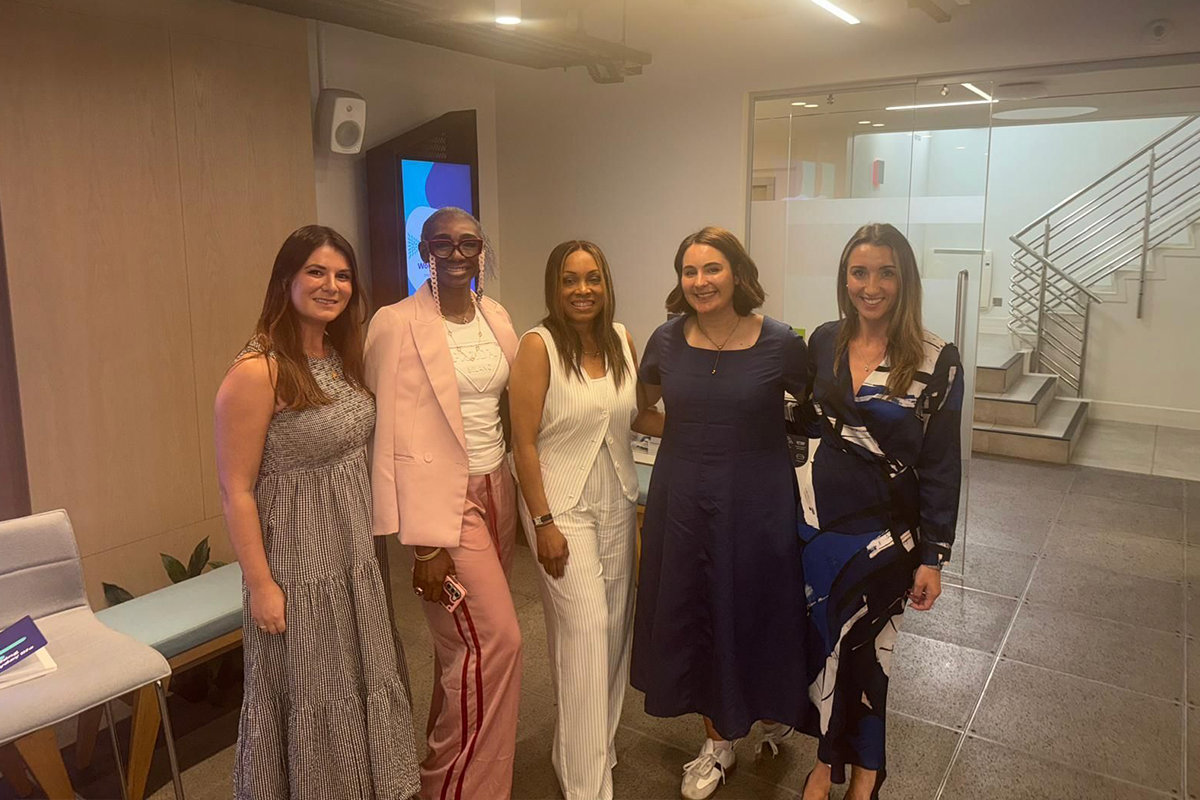On 26th June 2025, I had the privilege of joining an extraordinary panel for Women TechConnect, hosted by Bauer Media Outdoor UK in partnership with Ventula Consulting. Alongside two exceptional women — Wumi Akinseyeand Emily Wood — we explored a topic that quietly shapes, stalls, and challenges many careers, especially for women in technology: Imposter Syndrome.
The energy in the room was undeniable. From candid stories to empowering moments, we were surrounded by professionals from across the tech space — women at different stages of their careers, a few thoughtful male allies, and a shared recognition that although many of us look confident on the outside, the internal narrative can sometimes tell a different story.
As a speaker, coach, and board advisor, I’ve worked with people navigating some of the most complex transformations — professionally and personally. And yet, I too have known the weight of imposter syndrome. This panel wasn’t just about sharing knowledge — it was about validating experiences, recognising patterns, and offering practical strategies to move through them.
The Reality of Imposter Syndrome
Imposter syndrome is not a lack of confidence. It’s the persistent, internalised fear of being found out — as if your success is a fluke, your knowledge temporary, and your place at the table borrowed. It’s feeling like a fraud, even when there’s evidence of your competence everywhere around you.
Many women in tech, particularly those from underrepresented backgrounds, experience it acutely. As one of our fellow panelists shared: “I never felt imposter syndrome until I moved into tech. Suddenly I was the only woman on the call, with a personality that didn’t match the norm — and it started to chip away at my confidence.”
This isn’t rare. When the spaces we enter don’t reflect who we are — in gender, background, communication style, or values — we often internalise that disconnect. Instead of challenging the system, we challenge ourselves.
How It Shows Up
At the panel, we unpacked the subtle and not-so-subtle ways imposter syndrome shows up in the workplace:
Over-preparing for meetings that others walk into casually.
Withholding ideas for fear they’re not “fully formed” or “expert enough.”
Feeling like you need to prove your worth constantly, even after years of results.
Dismissing compliments, promotions, or successes as luck or timing.
Avoiding visibility — not because you lack ambition, but because visibility feels like risk.
Your difference is your strength. I don’t have a computer science degree, but I’ve lived across four countries, worked in education and care, and learned how to build teams with empathy and clarity. That’s just as valuable — and it’s yours to own.
This resonated deeply with many of us on stage — and in the audience. In a world that celebrates a narrow definition of “expert,” the most powerful act is to redefine value on your own terms.
Recognising the Signs
One of the first steps in addressing imposter syndrome is being able to spot it. Not just in ourselves, but in others. During the discussion, we shared some key indicators to look out for:
You avoid applying for roles or opportunities unless you meet 100% of the criteria.
You downplay your success or feel uncomfortable talking about your achievements.
You fear being “exposed” for not knowing everything.
You constantly compare yourself to others in your field.
You attribute your progress to external factors like timing, support, or even luck — but rarely your own ability.
Once you name it, you can start to address it. Because, as Wumi Akinseye rightly said:
“These thoughts are common — but they don’t have to control your narrative.”
Strategies to Combat It
We didn’t want the panel to be all talk — we wanted it to be a space of transformation. So, each of us shared tools and strategies we’ve personally used or coached others through. Here are some of the most impactful:
1. Own Your Story
You don’t need to be like everyone else. You just need to know who you are. Your journey — with all its turns, challenges, and victories — is your unique value. Learn how to tell your story with confidence.
“You’ve got your own story. Own it.”
2. Reframe the Fear
Instead of thinking “I don’t belong,” ask: “What am I here to learn?” or “What new perspective do I bring?” Growth happens at the edge of comfort — that discomfort may just be a sign you’re expanding.
3. Mentorship and Sponsorship
We spoke about the power of being seen. Not just advised — sponsored. A mentor might coach you; a sponsor opens doors, advocates for you in rooms you’re not in, and helps you build visibility.
As I shared during the panel, this has been transformational in my own journey. Surrounding yourself with mentors — and later becoming one — is one of the most empowering ways to shift from doubt to direction.
4. Speak Up for Others
Sometimes, reflecting someone else’s brilliance back to them helps us see our own. Be a mirror. Shout out the strengths of others — it matters more than you think.
Practise celebrating others’ wins publicly. Not only does it foster trust and community, but it also strengthens your ability to spot and value your own contributions.
5. Anchor in Evidence
Keep a “wins folder.” Save thank-you emails, results, testimonials, or just your own notes after a project goes well. When imposter thoughts creep in, review them. Let facts challenge the fiction.
The Power of Allyship and Community
Perhaps the most encouraging part of the evening was how much allyship came up — from hiring managers to team leads who choose to invest in someone’s potential, not just their past.
One of the most memorable moments was when Emily shared:
“When I told Bauer Media I wanted to be a senior engineer, they didn’t say ‘prove it.’ They said, ‘let’s get you there.’ That kind of belief is powerful.”
It reminded all of us that the antidote to imposter syndrome isn’t always internal. It often starts with being seen, supported, and backed — not only by mentors but by institutions and peers who believe in equity, not just equality.
My Reflections as a Panelist
I walked away from the evening with immense gratitude — not only for the honour of being part of such an important conversation, but also for the chance to hear the personal reflections of Wumi and Emily. Both women brought sharp insight, authenticity, and strength — and reminded us that vulnerability is not weakness, but leadership in action.
As someone who coaches others on voice, visibility, and transformation, it was important for me to speak honestly — not just from a place of expertise, but from lived experience. I’ve felt imposter syndrome even while advising boards and leading international programmes. The key isn’t pretending it’s not there — it’s learning to walk beside it without letting it lead.
In Closing: What You Can Do Next
Whether you’re a woman in tech, a new leader, a mid-career changer, or someone navigating visibility for the first time, here are a few steps to start reclaiming your space:
Name the doubt — awareness is power.
Share your story — someone else may need to hear it.
Ask for what you need — mentorship, feedback, opportunity.
Support someone else — it shifts the whole ecosystem.
Redefine your metrics — success is more than a job title.
Imposter syndrome is real. But it’s not the full story. You are.
Gratitude
A heartfelt thank you to Bauer Media Outdoor UK, especially Gesa Matyschok and Daylian Opare, for not only hosting the event but creating a space where real conversations could flourish. Thank you to Ventula Consulting for your allyship, insight, and dedication to building inclusive pathways in tech. And to Women TechConnect — thank you for connecting voices that matter.
To my co-panelists, Wumi Akinseye and Emily Wood — thank you for your brilliance, honesty, and humour. You made the evening powerful and unforgettable.
If you’d like to connect, speak further about these topics, or invite me to join a future panel, feel free to reach out. Let’s keep the conversation going — because the more we talk about imposter syndrome, the less power it has over us.




